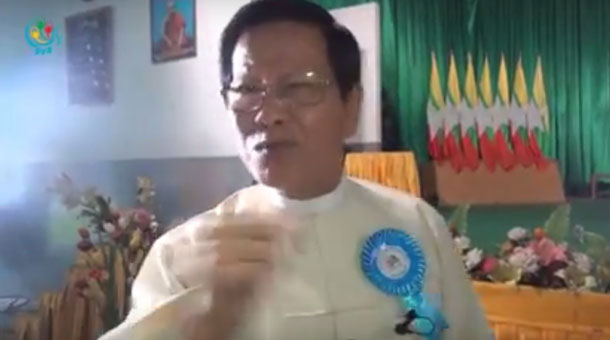RANGOON — Burma’s former spy chief has urged the nation’s media to refrain from criticizing the former military regime, warning that it could negatively impact development in the former pariah state.
In video interview posted by DVB on Monday, Khin Nyunt said that digging into the actions of the country’s former leaders was counterproductive and irrelevant, calling on reporters to be more introspective.
“If you want to criticize other people, do it to yourself first,” Khin Nyunt said, speaking after a drug abuse conference in Rangoon.
When asked what he thought about the former regime’s tight grip on the media, he angrily retorted that “it was a different system.”
“We were a military government,” he continued, “so we had to do as the regime did. Now we have a democracy, but our democracy has to be suitable for Burma.”
Cautioning reformers to craft a custom-designed democratic system, he suggested: “Don’t copy the United States and the UK. That’s what I want to say.”
The video clip went viral on social media cites, drawing criticism from viewers who interpreted his comments as “bossy” and “arrogant.” One Facebook user commented that Khin Nyunt “seems like a dying old tiger in defiance.”
Pho Thauk Kyar, a leading member of Burma’s Press Council, defended the right of journalists to view both history and current events with a critical eye.
“I have to ask, does he not want the media to reveal the wrongdoings of the past?” he said, speaking to The Irrawaddy by phone on Tuesday. “If the media takes a positive approach to taking lessons from the past, it is acceptable.”
Often referred to as Burma’s “Prince of Evil,” Khin Nyunt once oversaw the country’s notorious military intelligence unit until his ouster for corruption in 2004. He is said to have been among the key architects of a brutal crackdown on the 1988 popular uprising, which led to countless deaths of monks, students and other activists.
Members of his intelligence unit have often been accused of torturing political prisoners across the country. Despite years of calls from activists—including many who were imprisoned under his watch—the 75-year-old has to date refused to apologize for his actions under the former regime, maintaining that Burma’s thousands of jailed dissidents were “guilty.”

















